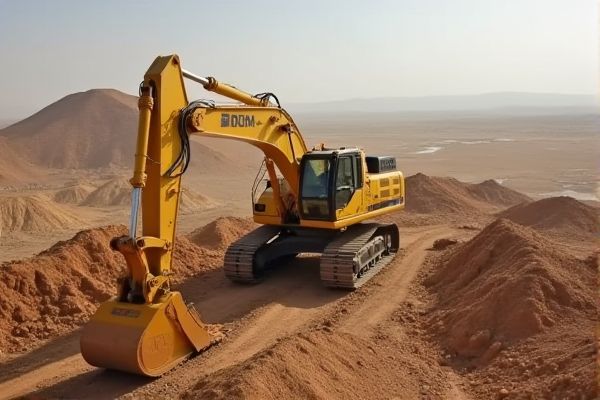
Ethiopia's construction sector is experiencing significant growth, fueled by government investments in infrastructure development and urbanization projects. Positions range from skilled labor roles to project management, with opportunities in residential, commercial, and civil engineering projects. The ongoing development of roads, bridges, and housing initiatives is creating a high demand for construction professionals. Networking with local construction companies and trade associations can enhance job prospects in this expanding market.
Job Description
Construction jobs in Ethiopia involve a variety of roles ranging from project management to skilled trades like masonry and carpentry. You may work on infrastructure projects, including roads, bridges, and buildings, which are essential for the country's economic growth. Safety regulations and adherence to local building codes play a crucial role in ensuring quality and sustainability. Opportunities for professional development and collaboration with international firms can enhance your skill set and career prospects in this growing sector.
Requirement
Construction jobs in Ethiopia often require a high school diploma or equivalent, although a degree in civil engineering or construction management can be advantageous. Familiarity with local building codes and regulations is essential, ensuring safety and compliance throughout projects. Practical experience, such as internships or apprenticeships, may enhance your qualifications and increase job prospects. Proficiency in construction management software and strong communication skills further contribute to success in this growing industry.
Salary and Perks Expected
Construction jobs in Ethiopia offer a competitive salary that typically ranges between 500 to 1,500 USD per month, depending on experience and specialization. In urban areas like Addis Ababa, opportunities for higher wages and career advancement in the construction sector are more prevalent. Workers may also benefit from perks such as health insurance, transportation allowances, and housing support, which can greatly enhance overall job satisfaction. Understanding the local labor market and typical compensation packages can help you make informed career decisions in this growing industry.
Similar Job Names
- Project Manager
- Site Engineer
- Civil Engineer
- Construction Foreman
- Quantity Surveyor
- Safety Officer
- Architect
- Construction Laborer
- Structural Engineer
- Electrical Engineer
- Mechanical Engineer
- Surveyor
- Building Inspector
- Draftsman
- Concrete Technician
- Road Engineer
- Estimator
- Site Supervisor
- Heavy Equipment Operator
- Plumber
Job Expectation Concept
Construction jobs in Ethiopia encompass a variety of roles, including project managers, engineers, and skilled laborers. These positions often require a solid understanding of local building codes and regulations, as well as the ability to work with diverse materials. The growing demand for infrastructure development presents numerous opportunities for career advancement in the sector. Many employers value practical experience and a willingness to adapt to the evolving construction landscape in Ethiopia.
Career Advantage and Weakness
Construction jobs in Ethiopia offer significant career advantages, including high demand due to rapid urbanization and infrastructure development. Many skilled workers can enjoy competitive salaries and opportunities for advancement as the sector expands. However, challenges exist, such as harsh working conditions and potential safety risks on job sites. Staying informed about regulations and best practices can help you navigate these difficulties and enhance your career prospects.
Important Thing Must Know
Construction jobs in Ethiopia are rapidly growing due to ongoing infrastructure development and urbanization efforts. Major projects include roads, bridges, and housing developments, providing numerous employment opportunities for skilled and unskilled workers. The demand for engineers, project managers, and laborers is expected to increase as the country focuses on improving its economic framework. Understanding local regulations and safety standards is crucial for any job seeker, as these factors influence work practices and compliance. Your ability to adapt to the evolving construction landscape will enhance your prospects in this booming industry.
Alternative Career Options
Ethiopia's construction sector offers numerous alternative career options beyond traditional roles. Opportunities exist in project management, where you can oversee construction timelines and budgets, ensuring projects meet deadlines and financial constraints. Additionally, sustainable building practices are gaining traction, creating demand for specialists in green construction and energy-efficient designs. Pursuing careers in construction technology and building information modeling (BIM) can enhance your skills and open doors to innovative practices in the rapidly evolving industry.
Companies List
- Midroc Ethiopia Construction
- Ethiopian Construction Design and Supervision Works Corporation
- Sunrise Construction
- United Engineering
- Goh Construction
- Genzeb Engineering
- Afro-Tsion Construction
- Awash Construction
- MCT Construction
- Huda Construction
List of Ideal City
Ethiopia has experienced significant growth in its construction sector, with cities like Addis Ababa leading the way. In the capital, many opportunities arise due to ongoing infrastructure projects and urban development initiatives. Other promising cities include Hawassa, known for its industrial parks, and Mekelle, which is seeing expansion in residential and commercial construction. Opportunities also exist in Dire Dawa and Jimma, as local governments prioritize development projects to stimulate the economy.
 jobs-ethiopia.com
jobs-ethiopia.com